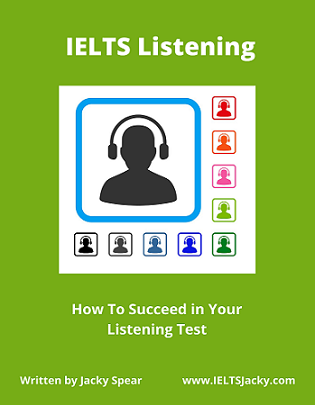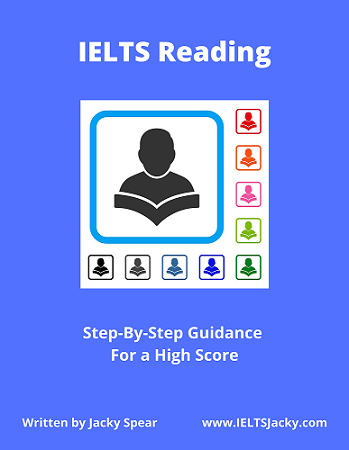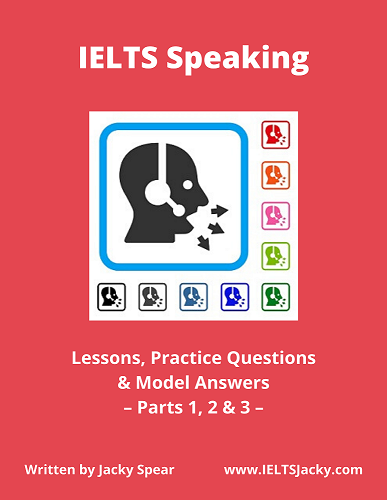IELTS Listening Tips
10 Top Tips for a High Score
All the lessons in this section of the website are packed full of IELTS Listening tips, strategies and advice but here are 10 things I especially want to highlight.
1) Listen to English every day
The only way to improve your listening skills is to listen to English every day. It doesn’t matter if it’s just 10 or 15 minutes here and there as you’re travelling on a bus, eating lunch or cooking the tea, just listen to something.
You need to hear English used naturally in many different contexts and spoken with a range of accents. In your test, you could hear speakers from the UK (including different regional accents), Ireland, the US, Canada, New Zealand, Australia or South Africa.
2) Listen to a range of things
The test will include two monologues (one person speaking) and two conversations, so you must practice listening to both. You’ll find all the practice material you need online. Podcasts and TED Talks are great for listening to monologues, and radio broadcasts and interviews on YouTube ideal for conversations.
You’ll find more resource ideas here: How To Improve IELTS Listening
3) Improve your vocabulary
The third of my IELTS Listening tips might seem obvious but many students don’t know the most effective way to improve their vocabulary. Just memorising lists of new words will achieve very little. You won’t fully understand the words – what they mean and how they’re used in context – and you’ll quickly forget them.
When you listen to spoken English, listen actively, that is, note down words you hear that are unfamiliar or you don’t fully understand. Then, check them out in a dictionary. Note the meaning, pronunciation, how the word is used in a sentence, common synonyms, antonyms and collocations. Record all this information in your vocabulary notebook.
Yes, this takes time, but it’s time well spent. Every time you do this, you will have added one more word to your vocabulary that you’ll remember and be able to use confidently in all parts of the IELTS exam.
For more help with what vocabulary to learn and how to learn it, study the lessons in the Vocabulary section of the website.
4) Have a strategy
To score highly in the Listening test, you need to understand the 10 different types of questions and have a strategy for answering them. Click the links below to learn how to answer each type:
Also, study these important lessons. Each contains invaluable IELTS Listening tips and advice.
Listening Strategies – Learn 3 essential listening strategies – question analysis, answer prediction & how to use keyword clues.
Listening Skills – Learn the 4 key listening skills needed for a high score highly. Examples from real questions.
5) Identify your weaknesses
Throughout the website, you will hear me say, ‘Practice, Practice, Practice’. This is true, of course, but practice wisely. Just completing practice test after practice test isn’t necessarily going to improve your score. Take time to analyse your results and determine what mistakes you are regularly making. Then, work on improving these.
Extra IELTS Listening Tip 1:
Check your spelling. If it’s wrong you’ll lose the mark.
Is it grammar that’s letting you down, a limited range of vocabulary or do you find it hard to follow conversations? Identify your greatest challenges and focus on them.
The Cambridge English books of authentic test papers (and some online tests) include transcripts of the recordings. These will help you to understand why you got a particular answer wrong.
6) The introduction
My next two IELTS Listening tips relate to the test itself. First, the introduction.
Before the first speaker begins talking, there will be an introduction by a narrator in which you’ll be told what the recording is about, e.g.
You will hear a part of a seminar entitled Understanding the World's Oceans given by a climate scientist.
The speaker will then begin the talk or conversation by introducing themselves and, often, the subject or purpose of the talk, e.g.
Thanks to all of you for coming along today to hear about how the robotic float project is helping with ocean research.
These introductions give important information that will help you to understand the recording, So, listen carefully right from the start.
7) Signpost language
As the speaker(s) talk, listen out for signpost language. We use signposting to connect ideas and indicate to the listeners that we're moving on to a new idea. Signpost language includes words such as,
- first
- second
- then
- next
- after that
- finally
In a map or plan labelling question, you might hear phrases such as,
- Moving on...
- Now we come to...
- Beyond the library, you’ll come to the...
Extra IELTS Listening Tip 2:
Synonyms and paraphrasing will be used. Listen for the keywords in the questions but also, different words and phrases that have the same meaning.
These also indicate progression.
Recognising signpost language will help you to follow the recording more easily and better understand what is being said.
8) Capital letters
My next IELTS Listening tip concerns a grammar issue. Remember to use capital letters for proper nouns. If you forget, your answer will be marked wrong.
A proper noun is the name given to something to make it more specific. For example,
Common noun
a boy
a city
a country
a day
an organisation
Proper noun
Alex
London
China
Monday
United Nations
If you have difficulty remembering this grammar rule, write your answers for the Listening test in capitals so you don’t make a mistake.
9) Read the instructions
Read the instruction carefully, paying particular attention to how many words you’re allowed to write for the answer. For example,
Write NO MORE THAN THREE WORDS AND/OR A NUMBER for each answer.
If you write more than three words, your answer will be marked incorrect even if the information you give is correct.
Other questions might tell you to write NO MORE THAN TWO WORDS or ONLY ONE WORD, so be careful. Don’t lose marks over silly mistakes like this.
10) Are you ready?
Don’t book your test until you’re ready to take it. I get
many emails from students asking for last-minute IELTS Listening tips and
tricks as their exam is a few weeks away and they know their English is not good
enough for the score they want.
If you’re not ready, don’t take the test!
The IELTS exam is designed to test whether your English is of the standard needed for the career or life change you are planning. No language tips and tricks are going to help you in real life, so don’t expect them to in the test either.
Put in the time and effort required for as long as it takes to get the score you need and you’ll eventually be living your dream. Take the test too soon and you'll experience only disappointment, a loss of confidence and wasted money.
All my lessons are created to help you achieve your dream as soon as possible. Please make full use of them and study hard.
Want to watch & listen to this lesson?
Click on this video.
IELTS Listening – All Lessons
IELTS Listening Test – Understand the format & question types. Know what skills are assessed. Also, discover 3 important marking tips.
Listening Strategies – Learn 3 essential listening strategies – question analysis, answer prediction & how to use keyword clues.
Listening Skills – Learn the 4 key listening skills needed for a high score highly. Examples from real questions.
Listening Exercises – 8 listening exercises to help you recognise & learn vocabulary for 6 common topics – time, numbers, prices, dates, letter names & addresses.
The 10 Question Types – Examples of all 10 types of Listening questions. Learn how to recognise & understand them. Links to 10 step-by-step lessons.
Listening Tips – Top 10 tips to bring you success in your Listening test. Essential information you need to know to achieve a high score.
How to Improve Your Listening Skills – 6 simple strategies essential for achieving a high score in the test.
Listening Practice – 4 practice techniques to develop your listening skills
Map & Plan Vocabulary – Learn the vocabulary you need for your test. 5 maps & plans with sample sentences containing common vocabulary of location & direction.
Listening Practice Samples – Short activities to improve your listening skills & help you learn topic vocabulary.
Genuine Full Practice Tests:
The 10 Question Types
Click the links below to learn how to answer each type of question.







